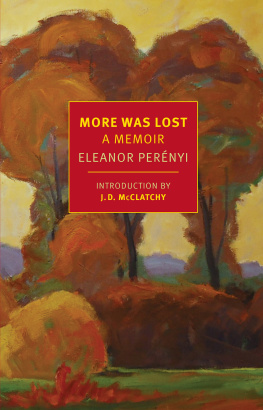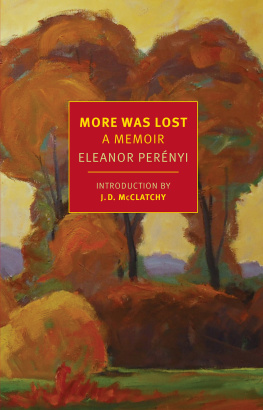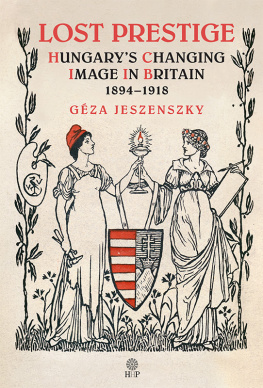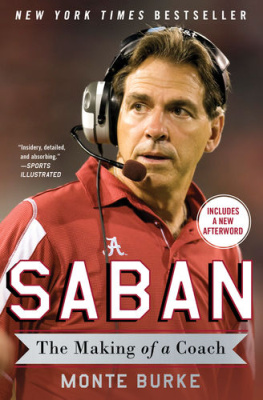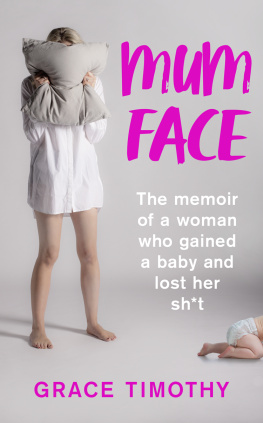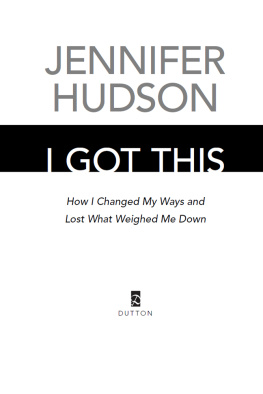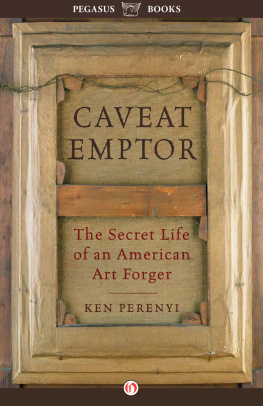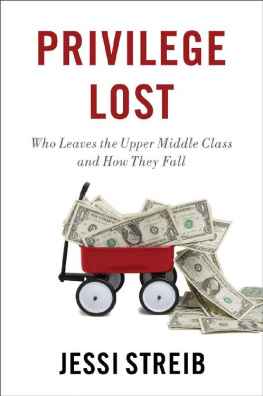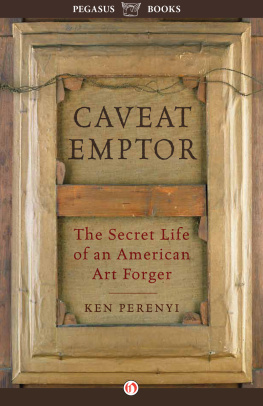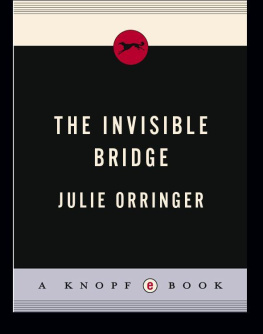
ELEANOR PERNYI (19182009) was born in Washington, D.C., the daughter of Ellis Spencer Stone, a naval officer, and Grace Zaring Stone, a novelist. At the age of nineteen, she traveled to Europe with her mother and, while attending a diplomatic dinner with her parents in Budapest, met Zsigmond (Zsiga) Pernyi, a young Hungarian baron. They married, moved to his familys neglected estate in Ruthenia, under Czech rule at the time, and began repairing the castle and restoring to working order the 750-acre farm and vineyard. With the outbreak of World War II, Zsiga was called to serve in the Hungarian army and persuaded Eleanor, then pregnant, to return to the United States. She settled in New York, raising her son and working as an editor for Harpers Bazaar, then as managing editor for Mademoiselle. Her first book, More Was Lost, was published in 1946, followed by a novel, The Bright Sword, in 1955. She achieved critical acclaim with Liszt: The Artist as Romantic Hero (1974), which was nominated for a National Book Award; however, her final book, Green Thoughts: A Writer in the Garden (1981), was Pernyis greatest success and is still considered a classic of garden writing.
J. D. M c CLATCHY is the author of eight collections of poetry, most recently Plundered Hearts: New and Selected Poems. He has written four books of prose, including Sweet Theft, and edited dozens of other books. His many libretti have been performed at the Metropolitan Opera, Covent Garden, La Scala, the San Francisco Opera, and other important houses around the world. He teaches at Yale University, where he also serves as the editor of The Yale Review.
MORE WAS LOST
ELEANOR PERNYI
Introduction by
J. D. M c CLATCHY
NEW YORK REVIEW BOOKS

New York
THIS IS A NEW YORK REVIEW BOOK
PUBLISHED BY THE NEW YORK REVIEW OF BOOKS
435 Hudson Street, New York, NY 10014
www.nyrb.com
Copyright 1946 by Eleanor Pernyi
Introduction copyright 2016 by J. D. McClatchy
All rights reserved.
Cover image: tefan Hapk, An Autumn Landscape; courtesy of the estate of tefan Hapk
Cover design: Katy Homans
Library of Congress Cataloging-in-Publication Data
Names: Pernyi, Eleanor, 19182009, author.
Title: More was lost / Eleanor Pernyi; introduction by J. D. McClatchy.
Description: New York: New York Review Books, [2016] | Series: New York Review Books classics | Originally published: Boston : Little, Brown and Company, 1946.
Identifiers: LCCN 2015040796 (print)| LCCN 2015045806 (ebook) | ISBN 9781590179499 (alk. paper) | ISBN 9781590179505 (epub)
Subjects: LCSH: Pernyi, Eleanor, 19182009. | Women gardenersConnecticutBiography. | AmericansHungaryBiography. | Women authors, AmericanBiography.
Classification: LCC CT275.P568 A3 (print) | LCC CT275.P568 (ebook) | DDC 818/.5409dc23
LC record available at http://lccn.loc.gov/2015040796
ISBN 978-1-59017-950-5
v1.0
For a complete list of titles, visit www.nyrb.com or write to:
Catalog Requests, NYRB, 435 Hudson Street, New York, NY 10014
CONTENTS
INTRODUCTION
W HEN I first met Eleanor Pernyi, forty-some years ago, she was putting the finishing touches on a book she was convinced would change her literary reputation. Twenty years earlier she had published a novel, The Bright Sword, a romance set during the Civil War, a thoroughly researched and detailed portrait of the confusing and bloody Campaign in the West. She grew to hate it and would never mention it. A decade before that novels appearance, she had published her first book in 1946, More Was Lost, a small memoir of her life in Ruthenia just before the Second World War, but she had thought of it as merely a collection of vignettes, and it was lost in the flood of postwar books about the huge horrors and small joys of civilian life during the 1930s and 40s. Her new book, long in the making, would be something substantial, scholarly, definitive. It would be a book large enough to slam like a door on the three decades of journalism she had been toiling over since she returned from Europe in 1940. It was the era of the dragon ladiesCarmel Snow and Diana Vreelandwho ran the fashion magazines, which in those days were high-toned and published first-rate articles and fiction. Pernyi ended up as the managing editor of Mademoiselle and contributed pieces on the arts, travel, and people for a dozen other periodicalsThe Atlantic, Harpers Bazaar, Town & Country, and the like. The New York party rounds could be glamorous, but the work to support such a life (and a young son) was exhausting. Her new book would change all that.
Liszt: The Artist as Romantic Hero appeared in 1974. It was long, braced by footnotes, drew on archives from all over Europe, and was nominated for the National Book Award. But the reviews were not what she had hoped for. Robert Craft, in The New York Review of Books, deplored her musical navet and complained that too much space was devoted to secondary characters and not enough to Liszt. Other critics complained that the book was merely a partial portrait, not a complete biography. The pedestal her hopes had dusted off was put back in the closet. Seven years later she published her last bookand it turned out to be the crown jewel. Green Thoughtswhose subtitle is A Writer in the Gardenwas instantly hailed as one of the best gardening books ever written and a delicious compendium of her contentious opinions and judgments. It has been continually in print ever since. And it encouraged its readers to rediscover her very first book, More Was Lost, also a marvelous display of her utterly original sensibility. Looking back now, it seems her career was bookended by two classics their author would not have predicted she would be best remembered for.
*
More Was Lost is a twice-told fairy tale, in which the young maiden and the handsome prince marry at last but do not live happily ever after. The dashing romantic story takes up only half the book; the second half turns it all inside out, and the black lining of the silver cloud is drawn over the loverswith shocking effect. Traveling with her parents around the world (her father was a naval officer, her mother a writer), young Eleanor Stone found herself with them one evening in 1937 at a dinner party given by the American ambassador in Budapest. At the other end of the table was a tall, blond, handsome Hungarian nobleman, Oxford-educated, fluent in several languages, Baron Zsigmond (Zsiga) Pernyi, who was clearly attracted to the lovely and witty young American woman seated across from him. A week later, after walks in the park and candlelit dinners, they agreed to marry. She was nineteen. He was thirty-seven. Their families were horrified. The brides parents: What is the use of a title that comes with no money? The grooms father, the old Baron (a distinguished Hungarian politician and patriot): What is the use of a pretty young girl if she comes with no money? What persuaded them all in the end was the castle.
The Pernyi estate lay in Ruthenia, at the exact geographical end of the Danubian plain, and the beginning of the Carpathians. It is a Hungarian-speaking part of the world that over the course of the twentieth century, by reason of dubious treaties and later the whims of Hitler, was controlled by the Hungarians, the Czechs, and the Russians, finally becoming a part of the Soviet Carpatho-Ukraine. But to a teenage bride it was a dream. The estate had forests and vineyards, a mountain and a river, a

